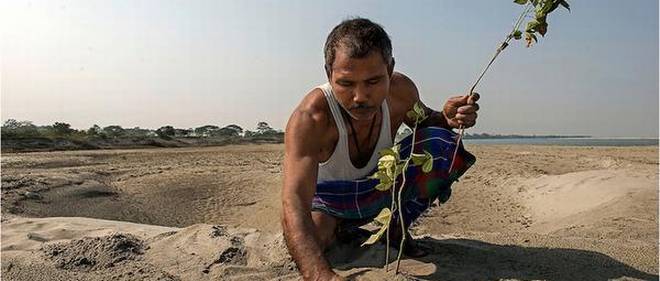Back when he was a young boy, Jadav Payeng started observing the chains of extinction of a lot of species of animals, reptiles and birds and wanted to know the reason lying behind this decrease in existence. Later, he learned that it was the decline in forest cover and deforestation that contributed to these animals losing their homes. He understood that the solution was to build new homes or forests for the animals.
Initially, he sought help from the forest department but they asked him to plant the trees by himself (which he actually did). He decided to locate a riverine island on the banks of River Brahmaputra, and began to plant the saplings all by himself. Payeng visited the island and planted a few saplings every day for three decades. He did not wish to depend on anybody and took it upon himself to care for nature and the harmless animals.
He faced several hurdles, the primary one being that he could not draw water from the river and water all the growing plants, as the area was quite vast for one man. In order to overcome this trouble, he came up with an idea to build a bamboo platform on the top of each sapling and placed earthen pots with small holes in them. The idea of this architecture was that the water would gradually drip on the plants below and water them through the week until the pots were drained of water.
His crusade began in 1980 when he started working with the social forestry division of Golaghat district when they launched a scheme of tree plantation on 200 hectares at Aruna Chapori – 5 km from Kokilamukh in Jorhat district, Assam. Payeng was one of the labourers who worked in that 5-year-long project. He preferred to stay back after the completion of the project even after other workers left, to look after the plants and continued to plant more trees on his own, in an effort to transform the area into a forest.
Payeng belongs to a tribe called “Mishing” in Assam, India. His lifestyle comprises of a small hut in the forest, with his wife and his 3 children. He owns a farm and sells the milk for his livelihood, which is his only source of income.
Payeng was honoured at a public function arranged by the School of Environmental Sciences, Jawaharlal Nehru University on 22nd April, 2012 for his remarkable achievement. JNU vice-chancellor Sudhir Kumar Sopory named Jadav Payeng as “Forest Man of India”.
In the month of October 2013, he was honoured at the Indian Institute of Forest Management during their annual event ‘Coalescence’.
When empathy becomes a source of inspiration, the strength one can draw from within is limitless, as witnessed in the life of Jadav Payeng.


